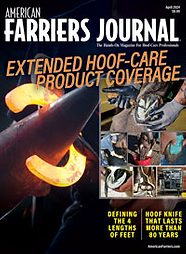The U.S. Labor Department recently dropped a bombshell on businesses when it reinterpreted the definition of employee under the Fair Labor Standards Act.
Labor Secretary Thomas Perez contends that businesses such as Uber, FedEx and those involved in construction have taken a wide berth in classifying workers as independent contractors. He alleges those businesses are trying to avoid paying overtime and providing benefits such as unemployment insurance and workers’ compensation. At the same time, he says the so-called misclassification of workers as independent contractors also undermines the collection of state and federal taxes.
Like most government decisions of this nature, there are unintended consequences. Farriers are among a number of true independent contractors in the American workforce, and you wish to remain classified that way. It might not be that easy for some of you.
“These changes probably will not affect most farriers working on backyard, privately owned horses,” says Buck O’Neil, a certified journeyman farrier who is a certified public accountant and holds a masters degree in taxation. “But if a farrier derives a significant portion of his or her income from one, or a very few, commercial barns, trainers or vet clinics, their status may be in question. Or, a farrier with an apprentice, or a series of apprentices, could be at risk financially.”
In order to protect workers who have been forced to become independent contractors, the U.S. government does not allow you to waive employee status. Rather, to determine whether a worker should be considered an employee or an independent contractor, the Department of Labor has designed a litmus test of sorts to guide workers and business owners.
- Do you perform work that’s integral to an employer’s business?
- Do you use your own independent business initiative, judgment and skills?
- Do you have a permanent working relationship with an employer?
- Does the business set your pay rate, work hours and duties?
- Do you make investments in equipment or facilities for business purposes?
- Do your decisions affect your opportunity for profit or loss?
The answers to these questions might seem straight forward, but there are nuances to the questions that might not be readily apparent. For example, you might not consider your working relationship to be permanent. However, seasonal or repeated weekly farrier visits might be enough to affect your status.
“A farrier who repeatedly travels to a barn a few days at a time to shoe certain horses and is paid by the barn for the work may be considered an employee of the barn,” O’Neil says.
In the September/October issue of American Farriers Journal, O’Neil pens an excellent overview and analysis of the Labor Department’s reinterpretation of the Fair Labor Standards Act and what it means for you and your practice. Be sure to pick up a copy to get a detailed understanding of how it could affect you. In the meantime, it’s incredibly important to keep detailed records to protect you and your business.
“Farriers working for large barns, trainers or vet clinics should be paid directly by the horse owner,” O’Neil advises. “Payment for the total services, use of dedicated barn or clinic space, barn or clinic utilities, scheduling of work by the barn or clinic, or even a regular work schedule, may weaken the independent contractor status.”








Post a comment
Report Abusive Comment